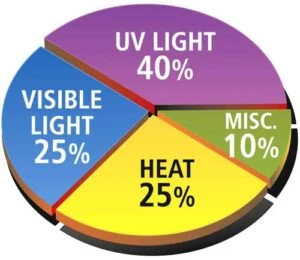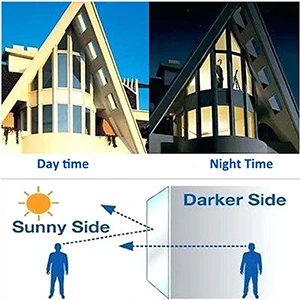Frequently Asked Questions
Are residential films worth the investment?
High-quality residential window films are durable and can last for many years with proper maintenance, making them a long-lasting investment for your home. Improve your comfort and increase your property value with window films!
What are “UV” rays?

What are “infrared” rays?
While UV rays are harmful and can cause skin damage and fading of furnishings, infrared rays are responsible for generating heat. Window film can effectively block a significant portion of infrared rays, reducing heat transfer into the building while still allowing visible light to enter. By targeting infrared rays as the source of heat, window film helps create a more pleasant and temperature-regulated space while also protecting occupants and interior furnishings from the damaging effects of UV radiation.
How does window film improve year-round comfort?
Window film creates a more comfortable environment through consistent climate control by eliminating “cold wall” and “hot wall” problems. Rooms stay more comfortable in the summer and winter, be reducing “hot spots”, no matter where the sun is shining.
Will window tint reduce fading?
All of our residential window films will reject 99% or more of the sun’s damaging U.V. rays, which can lead to fading and bleaching of fabric, furniture, carpet, and hardwood floors. Visible light and Solar heat also play a large role in fading as you can see in the chart below.
Can window tinting improve my home's security?
Security window films are an awesome investment for your windows, adding an extra layer of protection by making windows more shatter-resistant. This is beneficial for security in accidental incidents, severe weather, and break-ins.
How does window film lower energy costs?
In summer, window film reflects the hot sun, reducing heat gain and lowering air conditioning costs. In winter, window film retains heat — up to 15% — to reduce heating costs. This year-after-year reduction in energy costs can yield an impressive return on investment.
What is “One-Way" window Film?
“One-Way” Film is based on lighting, not the film itself. The side that is the brightest is the side that you can see. During the day when it is bright outside, you can see outside. At night, if you have lights on inside and no lighting outside, then it reverses allowing people outside to be able to see in your home.

Here is a great video describing how One-Way Mirrors work.
Will window tint reduce fading?

Will window tinting kill my house plants?
Are your window films scratch resistant?
Our residential window films are made with a scratch-resistant coating. However, the film can still be scratched if enough pressure is applied. Scratches and other personal damage is not covered under the Lifetime Warranty.
